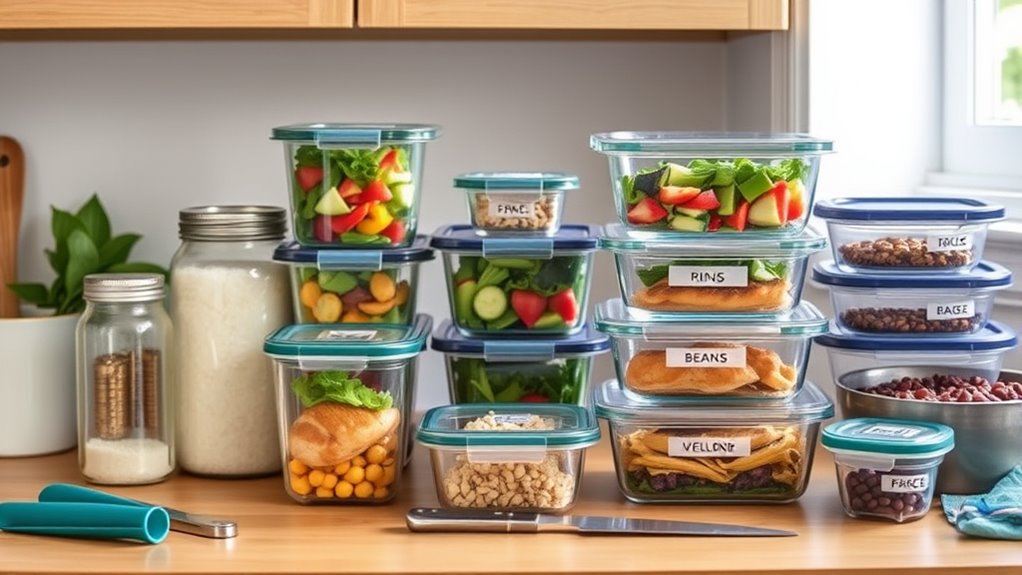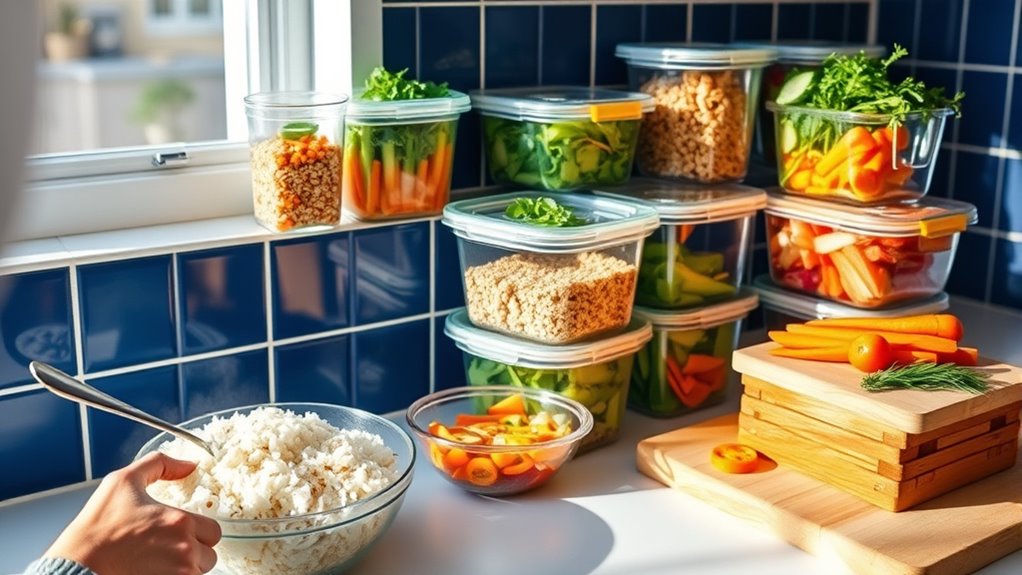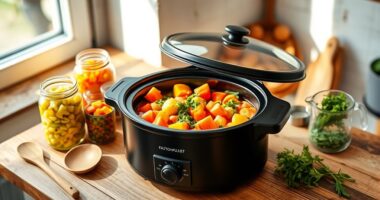To save time and money with meal prepping on a budget, focus on versatile, affordable ingredients like rice, beans, and seasonal vegetables. Prepare large batches and divide them into individual portions, making grab-and-go meals easier. Shop smart by buying in bulk, using coupons, and sticking to seasonal produce. Planning meals around sales keeps costs low and varieties interesting. Keep exploring for more tips to maximize your budget and simplify your meal prep routine.
Key Takeaways
- Use versatile, budget-friendly ingredients like rice, beans, and seasonal vegetables to create multiple meals.
- Prepare large batches of meals and divide into individual portions to save time and reduce waste.
- Shop in bulk, take advantage of sales, and incorporate seasonal produce for cost-effective shopping.
- Plan meals around sales and seasonal ingredients to maximize freshness and minimize costs.
- Focus on nutrient-dense ingredients and proper portioning to maintain health without overspending.

Meal prepping doesn’t have to break the bank. In fact, you can create nutritious, delicious meals without overspending by choosing affordable ingredients and mastering portion control. The key is to plan ahead and shop smart. Start by focusing on versatile, budget-friendly staples like rice, beans, seasonal vegetables, and affordable cuts of meat or plant-based proteins. These ingredients form the foundation of many inexpensive, filling meals. Buying in bulk can considerably reduce costs, especially for pantry staples like grains, lentils, and frozen vegetables. Plus, shopping sales and using coupons can help you stick to your budget while still getting quality ingredients.
When it comes to portion control, this is your best tool for saving money and minimizing waste. By preparing meals in single-serving containers, you avoid overeating and prevent leftover food from spoiling. This not only keeps your grocery bill in check but also helps you stick to healthy eating habits. Measure ingredients accurately to make sure you’re not using more than necessary—this is especially important for expensive ingredients like meat or cheese. Proper portioning ensures each meal provides enough nutrients without excess, reducing the temptation to snack on less healthy options or order takeout.
Another way to cut costs is to cook large batches of meals that can be portioned out over several days. Think chili, stew, or baked casseroles—these dishes are economical because they use affordable ingredients and can be easily scaled up. Once cooked, divide them into individual containers, making grab-and-go lunches or dinners that save you time and money during busy weekdays. This approach also allows you to take advantage of discounts on bulk purchases and store leftovers for future meals, further stretching your grocery budget.
It’s also helpful to get creative with your recipes. Use affordable ingredients in different ways to keep meals interesting and prevent boredom. For example, roasted vegetables can be added to salads, wraps, or grain bowls, maximizing their value. Incorporate seasonal produce to get the best prices and freshest flavors. Planning your meals around what’s on sale or in season means you’re making smarter choices while keeping costs low.
Additionally, incorporating nutrient-rich ingredients such as beans, lentils, and seasonal vegetables can help you maximize nutritional value without increasing your grocery bill. Ultimately, meal prepping on a budget comes down to smart shopping, portion control, and preparing versatile meals that you can enjoy throughout the week. With a little planning and effort, you’ll find that saving money and time in the kitchen is completely doable, all while enjoying healthy, satisfying meals every day.
Frequently Asked Questions
How Do I Prevent Meal Prep Boredom Over Time?
To prevent meal prep boredom over time, try variety strategies like changing up ingredients, cooking methods, or flavors regularly. Incorporate different spices, herbs, and sauces to boost flavor enhancement, making each meal feel new and exciting. Plan diverse menus and experiment with new recipes to keep things interesting. By mixing things up, you stay motivated, enjoy your meals more, and avoid falling into a monotonous routine.
Can Meal Prepping Accommodate Special Dietary Needs?
You can definitely accommodate special dietary needs through meal prepping. Explore gluten-free options and incorporate vegetarian substitutions to suit your diet. Planning ahead allows you to select ingredients that meet your restrictions, ensuring variety and nutrition. You can batch cook diverse meals, making it easier to stick to your diet and avoid boredom. By customizing recipes, you maintain control over what you eat while saving time and money in the kitchen.
What Are the Best Storage Containers for Meal Prep?
When choosing storage containers for meal prep, focus on container durability to guarantee they last through daily use. Look for options with portion control features, like dividers or marked measurements, so you can easily manage servings. Opt for BPA-free plastics or glass for safety and longevity. These containers make it simple to organize your meals, reduce waste, and stay on track with your dietary goals while saving time and money.
How Do I Handle Meal Prep for Large Families?
To handle meal prep for large families, start by dividing meals into family portions, ensuring everyone gets enough. Use ingredient scaling to adjust recipes easily, making enough for everyone without waste. Plan your prep sessions efficiently, batch cooking multiple dishes at once. With proper family division and ingredient scaling, you save time and make meal prep manageable, even for big groups. This approach keeps everyone fed and satisfied.
Are There Quick Tips for Cleaning up After Meal Prep?
To make quick cleanup easier, use simple cleaning hacks like wiping surfaces immediately after cooking and soaking pots and pans right away. Keep a spray bottle of all-purpose cleaner nearby for fast spot cleaning. Use disposable towels or paper towels to save time, and clean as you go to prevent mess buildup. These tips help you achieve a quick cleanup, keeping your kitchen tidy without wasting time after meal prep.
Conclusion
Just like Odysseus steering tricky waters, meal prepping on a budget takes a bit of strategy and patience. With a little planning, you’ll save time, money, and stress, making your kitchen feel less like a battlefield and more like a sanctuary. Embrace the journey, and soon you’ll find that good food and smart choices aren’t just myths from legends—they’re within your reach. Happy prepping!









